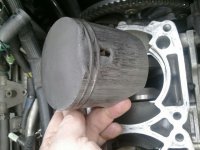How come the aftermarket can come up with decent pistons, but Poo can't? I'm being serious...is it because Poo's hands are tied by the EPA regs, and the aftermarket isn't (not sure how that would impact this)? Is it a supplier issue? I can't imagine they don't have the engineering know-how, but an aftermarket company does.
The following is my opinion, though I feel pretty strongly about it.
Poo is using cast pistons. They are cheaply made. The reason for cast pistons, besides the low cost, is to many people cold seized engines in the 90s and 2000s. Cast pistons don't expand fast like a forged piston will. Cast pistons are brittle and break. Now poo has to meet EPA regs. so IMO inside of using direct injection, they continue to use CFI. In order to help meet the EPA, they have IMO fairly loose piston to wall tolerances. Thus, allowing more oil, which they leaned way out to meet EPA, to get on the cylinder wall/piston. Now add that loose tolerance with pistons that are built so cheap that they are sometimes out of tolerance right from the factory and you have one big slop hole. The injector location isn't helping anything either. So anyway, now you have a piston that is rocking in the hole, the skirt of the piston is collapsing and making it more and more sloppy. So the end result is either a broken piston skirt, or a broken cylinder skirt. Guess what, polaris slightly thickened the cylinder skirting for 2013. My guess is there might be some piston skirt issues in a few years. Though I believe they thickened the piston skirts a couple of years ago.
Lots of people don't like using forged pistons because if you don't warm it up good you will stick a piston. I am a believer in proper warm up but I don't for minute think it is why Polaris engines are breaking skirts.
RKT has Wossner build his pistons to his specs. Apparently only he can get these pistons. From what I understand, the make up of the pistons is such that it is a forged piston with properties that make it expand slower than normal forged pistons. But he will still point out that proper warm up is a must. Also his pistons are much lighter than stock pistons and the are the same weight as each other. Again stock cast pistons are not always ( or maybe ever) the same weight. The Polaris 800 also vibrates much less with his pistons.
Now I don't want to sound like I am pushing RKT stuff. But I think he has it figured out. Though other companies have made the Polaris 800 more reliable than stock as well. Indy Dan and MTNTECH are 2 others off the top of my head. And both have pretty stellar reputations as well.
As far as the manufacturers engineers, I'm not to impressed with them, though I'm sure a lot of it has to do with having their hands tied by the bean counters. If they wanted to make reliable engines I think they could. Any brand. Though I would expect prices to rise by a bunch.


